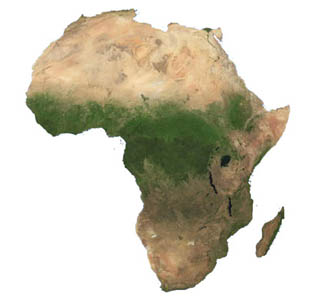Africa escapes financial knock-out but knock-on feared
 Nairobi/Johannesburg - While markets in the United States, Europe and Asia were receiving their worst battering in decades last week, Africa's economy, which has been relatively unscathed by the global financial meltdown, came in for some rare praise.
Nairobi/Johannesburg - While markets in the United States, Europe and Asia were receiving their worst battering in decades last week, Africa's economy, which has been relatively unscathed by the global financial meltdown, came in for some rare praise.
British liberal weekly, the Economist, which once described Africa as "the hopeless continent," was suddenly "cheerfully positive" at developments in Africa.
Pointing to strong growth over the past five years in sub-Saharan Africa, the Economist found that, while Africa was "bound to suffer" from the knock-on effect of the credit crisis, it was likely to suffer less than other regions.
At the same time, the World Economic Forum was debunking the notion that Africa was an instantly riskier investment than Europe or the United States.
In its rating last week of banks by security of investment, South Africa, the African country worst-affected by the credit crisis so far, beat out Switzerland, Germany, Britain and the US for 15th place.
Africa's limited exposure to global markets means it has been relatively unscathed by the global financial crunch, but economists are warning that the knock-on effect could be significant.
According to the African Development Bank (AFDB), Africa only represents 1.3 per cent of world stock market capitalisation, 0.8 per cent of bank assets and 0.2 per cent of debt securities.
But according to the President of the African Development Bank, Dr Donald Kaberuka, Africa is far from inured, with the slowdown in the global economy likely to dent economic growth.
"On the whole, Africa recorded sustained and unprecedented growth of about 7 per cent over the last decade," he said at a recent press briefing. "The current crisis could slow down these hard-earned gains."
While Kaberuka did not hazard a figure, the IMF is already predicting a dip to just over 6 per cent in 2008-2009.
Among the risks for Africa is that developed economies, faced with recession and having to fund expensive bank bail-outs, could reduce their investment on the continent and also increase protectionism, hitting African exports.
Middle-income nations will also face an increase in the cost of borrowing on capital markets, making access to loans more difficult, he said. South Africa's state electricity supplier Eskom has already warned consumers they face steep tariff hikes because the company can no longer depend on the markets to fund its multi-billion-dollar investment programme.
The announcement came in a week in which the Johannesburg Stock Exchange, Africa's largest, tracked the slump in international markets as investors rushed to get rid of shares in "risky" emerging markets, bringing the bourse's contraction to 29 per cent this year.
The World Bank has sounded the alarm about the impact of the credit crisis on prices in developing nations.
"While people in the developed world are focused on the financial crisis, many forget that a human crisis is rapidly unfolding in developing countries," said World Bank President Robert B. Zoellick.
"The financial crisis will only make it more difficult for developing countries to protect their most vulnerable people from the impact of rising food and fuel costs."
Then there is the issue of aid inflows to Africa.
World leaders promised at a UN summit in September not to let the global crisis affect aid, but even before the crisis deepened, developed countries were simply not meeting their aid targets.
G8 nations pledged to double their aid to Africa by 2010, but former UN Secretary General Kofi Annan in June said that at the current rate of progress the G8 would fall short by 40 billion dollars.
Subsequent meetings of the G8 and the UN have failed to significantly alter this outlook.
Most campaigners believe that The Millennium Development Goals (MDGs), a series of ambitious UN targets aimed at improving the plight of the world's poorest by 2015, are now in even greater danger because of the deepening crisis.
"It is too early to predict the effects, because typically the poor don't have access to markets, but we are really concerned that poor countries will be made to pay for the market's mistakes," Matt Grainger, spokesman for Oxfam International, told Deutsche Presse-Agentur dpa.
Grainger said that previous experience of global recessions in 1972-73 and again in 1990 and 1993 showed that aid levels dropped off dramatically.
"It would be immoral if the developed world decides to cut aid and trade, but booking at history, the omens are pretty bleak," he said. (dpa)